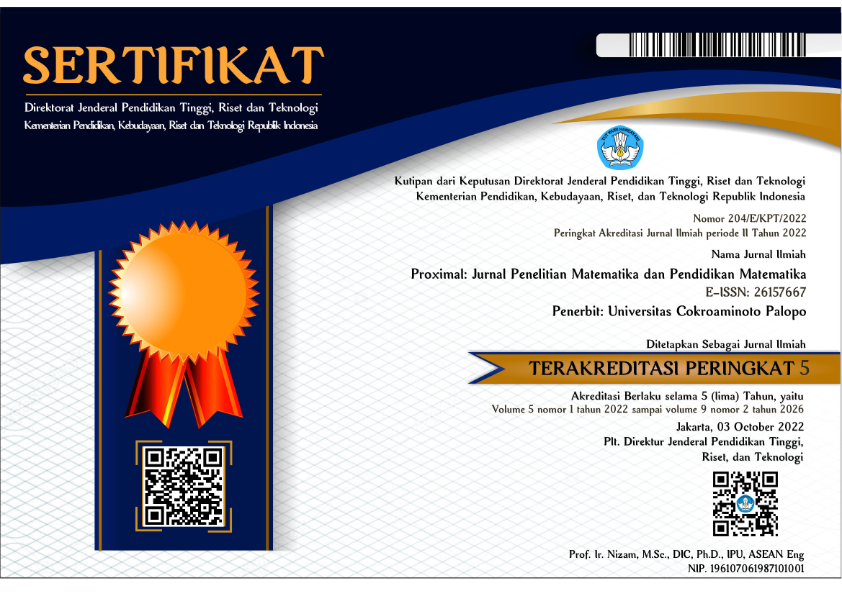DESKRIPSI GAYA BERPIKIR SISWA PADA PENERAPAN MODEL PEMBELAJARAN KOOPERATIF TIPE THINK PAIR SHARE
DOI:
https://doi.org/10.30605/proximal.v4i1.506Keywords:
Gaya Berpikir, Pembelajaran Kooperatif tipe Think Pair ShareAbstract
Penelitian ini merupakan penelitian kualitatif dengan tujuan untuk mengetahui gambaran gaya berpikir siswa pada penerapan model pembelajaran kooperatif tipe Think Pair Share. Subjek ditentukan sebanyak dua orang siswa yang masing-masing memiliki dominan gaya berpikir konkret dan gaya berpikir abstrak yang kuat. Analisis dilakukan secara mendalam pada subjek dengan menerapkan model pembelajaran kooperatif tipe Think Pair Share dengan materi garis dan sudut. Metode pengumpulan data menggunakan metode dokumentasi, metode tes dan wawancara melalui 4 langkah analisis yaitu menelaah data, reduksi data, penyajian data, dan menafsirkan data. Hasil penelitian menunjukkan bahwa: (1) Baik subjek bergaya pikir konkret maupun abstrak, meraka mampu belajar dengan aktif pada penerapan model pembelajaran kooperatif tipe Think Pair Share (TPS). (2) Kedua subjek memiliki kemampuan yang sama, akan tetapi subjek gaya berpikir kongkret lebih kuat dalam menyelesaikan masalah berupa soal gambar sedangkan subjek gaya berpikir abstrak lebih kuat dalam menyelesaikan masalah berupa soal uraian.References
Downloads
Published
Issue
Section
License
In submitting the manuscript to the journal, the authors certify that:
- They are authorized by their co-authors to enter into these arrangements.
- The work described has not been formally published before, except in the form of an abstract or as part of a published lecture, review, thesis, or overlay journal.
- That it is not under consideration for publication elsewhere,
- That its publication has been approved by all the author(s) and by the responsible authorities – tacitly or explicitly – of the institutes where the work has been carried out.
- They secure the right to reproduce any material that has already been published or copyrighted elsewhere.
- They agree to the following license and copyright agreement.
License and Copyright Agreement
Authors who publish with this journal agree to the following terms:
- Authors retain copyright and grant the journal right of first publication with the work simultaneously licensed under Creative Commons Attribution License (CC BY 4.0) that allows others to share the work with an acknowledgment of the work's authorship and initial publication in this journal.
- Authors are able to enter into separate, additional contractual arrangements for the non-exclusive distribution of the journal's published version of the work (e.g., post it to an institutional repository or publish it in a book), with an acknowledgment of its initial publication in this journal.
- Authors are permitted and encouraged to post their work online (e.g., in institutional repositories or on their website) prior to and during the submission process, as it can lead to productive exchanges, as well as earlier and greater citation of published work.
















